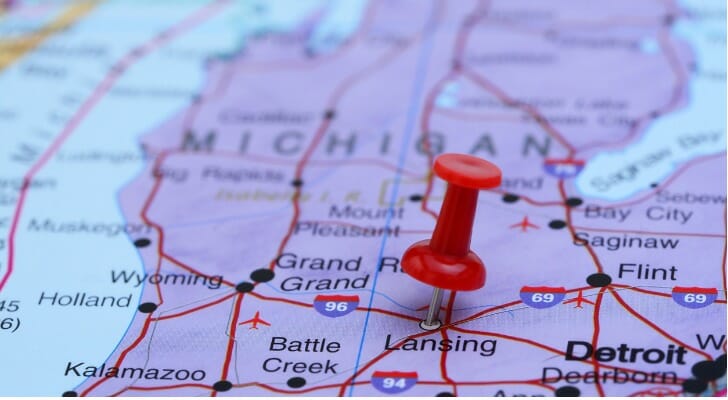Perhaps you’re drawn to the revitalized city of Detroit or the natural beauty of the Upper Peninsula. Regardless of where you want to move, the cost of living in Michigan can differ from city to city. So if a move to Michigan is in the cards, make sure you plan for major costs, like food, housing, taxes, utilities and more. Moving is a large financial decision that you may want to seek professional help with before deciding. You can work with a financial advisor to get your finances in order and save appropriately for these large life decisions.
Housing Costs in Michigan
According to NeighborhoodScout, nearly 70% of Michigan residents own a home, which places it in the upper echelon of the U.S. as far as homeownership rates go. In two of the state’s largest cities, though, this trend evaporates. In Detroit, just 47.2% of residents own a home. In Ann Arbor, the rate falls even further to 41.5%, but Ann Arbor is a college town.
There are also certain markets throughout Michigan that have extremely varied median home values. While the state’s median home value is $236,000, Detroit’s is a minuscule $85,000. The median home value in Ann Arbor is almost 10x that at $416,498.
Not ready to make a down payment? You’ll have to rent while you save up or until you decide whether you’re ready to settle down. The good news is that rent in Michigan is below the U.S. average, whether you go with a studio, a three-bedroom apartment or anything in between.
It is extraordinarily cheap to rent in Michigan. The median monthly rent for a two-bedroom apartment in Michigan is $757. That comes in less than the $1,295 national mark. Detroit is largely to blame for this disparity, as rent for a two-bedroom in the Motor City goes for $1,500 a month.
Cost of Utilities
A U.S. Energy Information Administration (EIA) report from puts the average monthly energy bill in Michigan at $143,41, which is substantially more than it was a few years ago. Which is good enough to rank 12th in the U.S. for most expensive energy bills. The total utility cost averages out to be $410.72 per month in Michigan, and the state falls right in the middle of the pack in the U.S. (30th).
Food Costs
According to the Living Wage Calculator from MIT, single adults in Michigan spend $3,058 of their $23,490 annual living wage on food. That works out to 13%, which is right around the national average.
Cities within the state differ, though. Numbeo.com data recommends minimum monthly food spending on food of $303.17 in Detroit and $272.72 in Lansing. That’s just for basic groceries, though. If you love to eat out, you’ll need to adjust your food budget accordingly.
Healthcare Costs
As an overall statement, Michigan’s healthcare prices appear to be slightly lower than the rest of the U.S. A study by the Health Care Cost Institute places the median healthcare price in Kalamazoo at 2% below the national median.
The Agency for Healthcare Research and Quality’s review of the average employee contribution for single coverage healthcare at private companies shows a similar pattern. In fact, Michigan’s $1,385 average is $30 less than the national average of $1,415.
College Education Costs

There are many colleges and universities throughout the state of Michigan that can provide an excellent education, though the prices vary quite widely. The University of Michigan offers a great education for a great price to Michiganders. Undergraduate tuition and fees at University of Michigan, for example, is $16,736 per year (underclassman) for Michigan residents and $18,836 (juniors and seniors) for non-Michigan residents. The price for non-residents of Michigan increases the tuition to $55,334 and $59,212, respectively.
Taxes in Michigan
Curious about what your tax bill will look like if you live in Michigan? The state has a flat income tax rate of 4.25%. However, cities add their own taxes on top of that rate. This ranges from 5.25% in most of the states to 6.65% in Detroit. Michiganders pay the 38th-highest property taxes in the country, by average property tax rate. Michigan’s average property tax rate is 1.54%.
The state has a base sales tax rate of 6%, with no county or local sales taxes added on. That means sales taxes are the same across the Great Lakes State. Gas taxes in Michigan are high, at 27.20 cents per gallon.
Entertainment Costs in Michigan

What about the cost of non-necessities in Michigan? There’s a range of options for you to pick from in the entertainment category. According to Statista data, the average ticket price for the Detroit Tigers baseball team is $28.15. If you’re more of an art-lover, you can check out the Frederik Meijer Gardens and Sculpture Park, where admission is $14.50 for adults. Or, there’s the Detroit Institute of Art, with tickets for $14.
Are you an outdoor enthusiast? You can visit the Grand Island National Recreation Area via ferry for $20 a round trip. If you love history, check out the car-free and history-filled Mackinac Island State Park, no tickets are required. Events here do cost money, though. Michigan also has plenty of places to visit where you can spend hundreds or thousands of dollars, depending on what you do and how long you stay. This includes the upper peninsula of the state that many people forget about when considering places in Michigan.
The Bottom Line
If you’re considering a move to Michigan then understanding how the cost of living breaks down is important. Michigan’s cost of living varies quite widely. For example, it ranks among the most expensive U.S. states to live for energy costs but the overall utility costs rank in the middle of the pack. Michigan has a lot of entertainment options, including some scenic weekend or vacation spots. All of this can add up so creating a budget before moving and saving enough to transition smoothly is important.
Next Steps for Your Move to Michigan
- If you’re nervous about dealing with the financial effects that come with a large move, you may want to talk to a financial advisor. These professionals can also help you with long-term financial planning for retirement or buying a home. Finding the right financial advisor that fits your needs doesn’t have to be hard. SmartAsset’s free tool matches you with up to three financial advisors who serve your area, and you can interview your advisor matches at no cost to decide which one is right for you. If you’re ready to find an advisor who can help you achieve your financial goals, get started now.
- Physical access to your bank account is important to many Americans. So if you’re considering moving to the Wolverine State, here are a few local banks to look into – First National Bank of America, Sterling Bank and Trust, Mercantile Bank of Michigan, First National Bank in Howell and First State Bank.
Photo credit: ©iStock.com/dpenn, ©iStock.com/dk_photos, ©iStock.com/Sean Pavone
